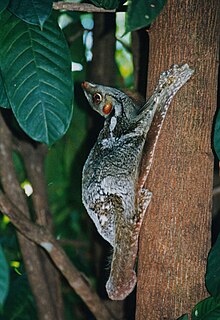巽他鼯猴
外观
| 巽他鼯猴 | |
|---|---|

| |
| 巽他鼯猴 | |
| 科学分类 | |
| 界: | 动物界 Animalia |
| 门: | 脊索动物门 Chordata |
| 纲: | 哺乳纲 Mammalia |
| 目: | 皮翼目 Dermoptera |
| 科: | 鼯猴科 Cynocephalidae |
| 属: | Galeopterus属 Galeopterus Thomas, 1908 |
| 种: | 巽他鼯猴 G. variegatus
|
| 二名法 | |
| Galeopterus variegatus (Audebert, 1799)
| |

| |
| 巽他鼯猴的分布範圍 | |
| 異名[2]:241, 252 | |
| |
巽他鼯猴(學名:Galeopterus variegatus)又稱马来亚鼯猴、馬來亞飛狐猴,是鼯猴科斑鼯猴屬Galeopterus的單型種。本種分布於東南亞,包括緬甸南部、泰國、越南南部、馬來西亞、新加坡與印度尼西亞(爪哇島、婆羅洲、蘇門答臘與峇里島)[1][3][4],並可分為外形相似、僅體型有異的兩大類群,體型較大的類群分布於巽他陸棚與中南半島,體型較小的類群分布於寮國與巽他陸棚的一些小島[3][5],較前者小約20%[6]。除了體型大小差異外,分子證據顯示巽他鼯猴的基因組已發生分化成四大支系:分布於爪哇島的G. v. variegatus、分布於蘇門答臘的G. v. temminckii、分布於婆羅洲的G. v. borneanus與分布於中南半島的G. v. peninsulae[3],甚至可能被進一步分拆為數個物種[7]。相較於本種分布於東南亞各地,同科的另一現生物種菲律賓鼯猴則僅分布於菲律賓南部[3]。
巽他鼯猴善於爬樹,難以在地面上移動[8];以皮膜滑翔時下降10公尺的高度即可滑行超過100公尺的距離[9]。本種為夜行性,但有時也在白天出沒[10];主要以樹葉為食[11],也有食用昆蟲的紀錄[12];本種目前被IUCN列為無危物種[1],但常為當地人的捕獵對象,且受棲地破壞威脅[13]。
參考文獻
[编辑]- ^ 1.0 1.1 1.2 Boeadi.; Steinmetz, R. Galeopterus variegatus. The IUCN Red List of Threatened Species. 2008: e.T41502A10479343 [16 March 2024]. doi:10.2305/IUCN.UK.2008.RLTS.T41502A10479343.en
 .
.
- ^ Chapman, H.C. Observations upon Galeopithecus volans. Proceedings of the Academy of the Academy of Natural Sciences of Philadelphia. 1902, 54: 241–254.
- ^ 3.0 3.1 3.2 3.3 Henke, Winfried; Tattersall, Ian. Handbook of Paleoanthropology. Springer Science and Business Media. 2007: 831–859. ISBN 978-3-540-32474-4. doi:10.1007/978-3-540-33761-4.
- ^ Corbet, G.B. and Hill, J.E. (1992). The mammals of the Indomalayan region: A systematic review. Natural History Museum Publications. Oxford University Press, Oxford
- ^ Stafford B.J.; Szalay F.S. Craniodental functional morphology and taxonomy of Dermopterans. Journal of Mammalogy. 2000, 81 (2): 360–385 [2024-07-22]. S2CID 86052722. doi:10.1644/1545-1542(2000)081<0360:CFMATO>2.0.CO;2. (原始内容存档于2023-12-20).
- ^ Ruggeri N.; Etterson M. The first record of colugo (Cynocephalus variegatus) from the Lao P.D.R.. Mammalia. 1998, 62 (3): 450–451. doi:10.1515/mamm.1998.62.3.439.
- ^ Janecka, J.E.; Helgen, K.M.; Lim, N.T.L.; Baba, M.; Izawa, M.; Boeadi; Murphy, W.J. Evidence for multiple species of Sunda Colugo. Current Biology. 2008, 18 (21): R1001–1002. Bibcode:2008CBio...18R1001J. PMID 19000793. doi:10.1016/j.cub.2008.09.005
 .
.
- ^ Vaughan, T.A. (1986). Mammalogy. 3rd edition. Saunders College Publishing, Philadelphia.
- ^ Feldhamer, G.A., Drickamer, L.C., Vessey, S.H. and Merritt, J.F. (2003). Mammalogy: adaptation, diversity, and ecology. 2nd edition. McGraw-Hill Companies Inc., New York.
- ^ Payne, J., C.M. Francis, K. Phillipps, S.N. Kartikasari. 2000. Panduan Lapangan Mamalia di Kalimantan, Sabah, Sarawak & Brunei Darussalam: 175, LG 19. Bogor: WCS-IP, The Sabah Society & WWF Malaysia.
- ^ Agoramoorthy G.; Sha C.M.; Hsu M.J. Population, diet and conservation of Malayan flying lemurs in altered and fragmented habitats in Singapore. Biodiversity and Conservation. 2006, 15 (7): 2177–2185. Bibcode:2006BiCon..15.2177A. S2CID 24313720. doi:10.1007/s10531-004-6900-1.
- ^ Davis D D. (1958). Mammals of the Kelabit Plateau Northern Sarawak. Chicago: Chicago Natural History Museum.
- ^ Nasir, M. D. & Abdullah, M. T. Distribution of the Sunda Colugo (Galeopterus variegatus) in Malaysia (Peninsular, Sabah, Sarawak). Tropical Life Sciences Research. 2010, 21 (2): 69–83 [2024-07-22]. PMC 3819077
 . PMID 24575200. (原始内容存档于2007-09-30).
. PMID 24575200. (原始内容存档于2007-09-30).
| ||||||||||||||||||||||||||||||||||||||||||||||||||||||||||||||||||||||||||||||||||||||||||||||||||||||||||||||||||||||||||||||||||||||||||||||||||||||||||||||||||||||||||||||||||||||||||||||||||||||||||||||||||||||
| ||||||||||||





